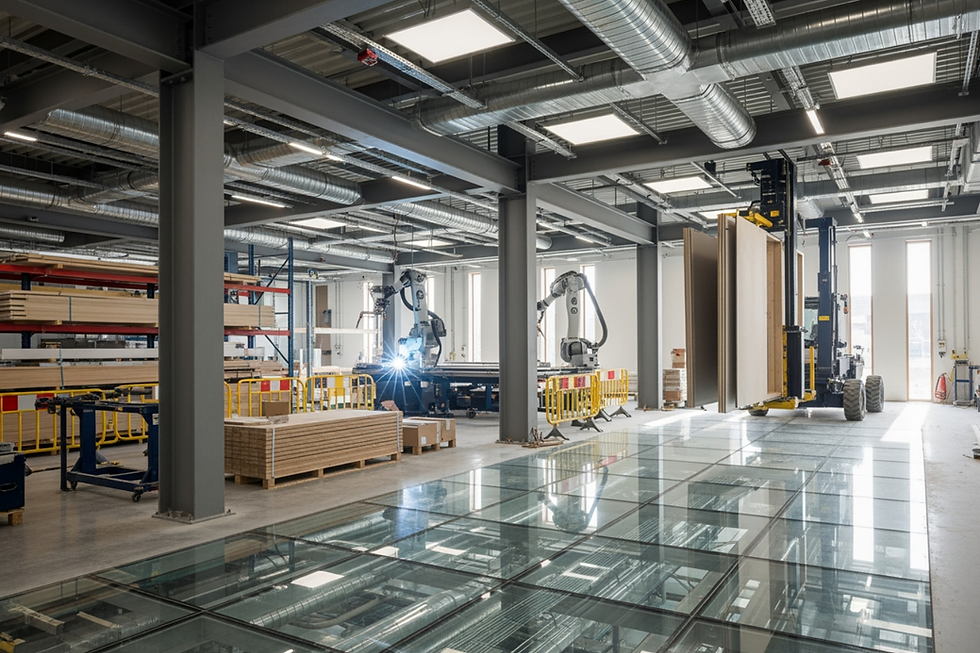Fundamentals of Commercial Construction Management
- NRG Consulting & Contracting

- Apr 15, 2025
- 6 min read

Key Highlights
Commercial construction management means managing projects from beginning to end. It ensures that work is completed on time, within budget, and meets the required standards.
Key parts include planning, design, construction, and after the building is done. This job requires a good understanding of building codes, safety rules, and the best practices in the industry.
People in this field have many duties. They manage budgets, contracts, risks, quality, and stakeholder communications.
Good communication, careful planning, and a proactive approach to risk management are needed to be successful in commercial construction management. These factors help deliver projects well.
People who want to be construction managers can gain from exceptional training and certifications. This can give them a better chance in this fast-moving field.
In the fast-changing world of commercial construction, good construction management is crucial for success. A commercial project, like an office building, a shopping center, or a factory, needs a lot of skill and careful planning. This helps make sure it is done on time and makes money. This is why skilled construction managers are so important.

Understanding Commercial Construction Management
Commercial construction management is about managing a construction project from start to finish. This means taking care of everything from the first planning steps to the final handover. It is a complex area. It needs a good understanding of design basics, building rules, safety laws, and how to manage projects.
Also, commercial construction management calls for strong leadership and good communication. This helps to manage many different people involved, like clients, architects, engineers, subcontractors, and suppliers.
Definition and Scope in Canada
The commercial construction management field in Canada is growing fast. This rise is due to new infrastructure projects and a busy real estate market. The construction industry needs skilled workers who can handle complex projects. Because of this demand, there is more focus on education and training for these roles.
Many schools, especially Ontario secondary schools, now provide special courses and workshops. These programs help future construction managers gain the knowledge and skills they need. They teach various topics like reading blueprints, estimating costs, understanding contract law, and managing risks.
The field of commercial construction management in Canada is large and keeps growing with new technology. Construction managers work on different types of projects. These include high-rise buildings, shopping malls, hospitals, schools, and industrial sites.
Key Roles and Responsibilities
The job of a construction manager is much more than just watching over building activities. They are the main contact person. They make sure everyone involved, like stakeholders, can talk and work together well. Their work starts even before construction begins. They come together with architects and engineers to check designs, create budgets, and set timelines.
As the building project moves along, the project manager handles contracts, buys materials, and coordinates with subcontractors. They keep track of work schedules, manage risks, and ensure the highest quality in everything done.
Good communication is key during the entire project. Construction managers hold regular site meetings, update clients, and tackle problems as they arise. Their skills in solving problems, making smart choices, and overcoming difficulties are very important for the success of the project.

Essential Stages of Commercial Construction Projects
Commercial construction projects usually go through clear stages. Each stage has its own goals and challenges. Knowing these stages is important for good management. It helps keep all stakeholders informed during the project's life.
Starting from the feasibility studies and design development to the final construction and finish, a well-organized approach is key. This helps make sure the project is successful and meets or goes beyond the client's expectations.
Project Initiation and Planning
The success of a commercial construction project depends a lot on good initial planning. This first step sets up the whole project. It defines the work needed, sets clear goals, and makes realistic timelines and budgets. Good planning lowers risks and helps everyone involved know what to do.
One important part of this planning is the preparation of estimates. This means carefully looking at the costs for things like labor, materials, equipment, permits, and other expenses. Having accurate estimates is key for getting funding and keeping the project financially stable.
Another important part of the planning stage is making detailed construction schedules. These schedules show the order of tasks, how they depend on each other, and how long each will take. They are essential for tracking progress, working together as teams, and making sure the project is finished on time.
Execution and Monitoring
Once the planning phase is complete, the construction process moves into the execution stage. This is where the actual construction activities take place, transforming blueprints and designs into tangible structures. During this phase, effective execution and diligent monitoring are essential to stay on track and ensure that the project aligns with the established plans and specifications.
Construction managers play a critical role in overseeing subcontractors, managing site logistics, and addressing any unforeseen challenges that may emerge. Regular site inspections, quality control checks, and adherence to safety protocols are paramount to delivering a high-quality project.
Continuous monitoring of the project's budget and schedule is also essential to ensure its financial viability. Construction managers track expenses, manage cash flow, and implement corrective actions to address any deviations from the plan.
Project Management Techniques in Construction
Effective project management techniques are very important for the successful delivery of complex commercial construction projects. Traditional methods, like the Waterfall model, have been used in the industry for a long time. They offer a clear and stepped process for activities.
But now, in our fast-paced world, agile methodologies are becoming more popular in construction. They provide flexibility, adaptability, and a way for teams to work together.
Traditional vs. Agile Methodologies
Traditional methods in project management, like the Waterfall model, take a step-by-step approach. In this model, each phase of the project is finished one after the other. This approach works well for projects that have clear requirements and do not expect many changes. They offer a strict way of managing projects, but they can be inflexible and struggle to meet changing client needs.
In contrast, agile methods focus on being flexible, working together, and making progress in small steps. Agile is often used in software development, but it also works well for construction projects that are uncertain or complex. By breaking projects into smaller parts or sprints, agile allows teams to make changes as needed.
Choosing between traditional and agile methods relies on the unique points of the project and how much flexibility is needed. Many construction companies are now using hybrid models. They mix the strong structure of traditional methods with the flexibility and quick response of agile ideas.
Importance of Communication and Coordination
In construction, good communication and smooth coordination are very important for a successful project. Many different stakeholders are involved, like architects, engineers, contractors, subcontractors, suppliers, and clients. Each one plays an important role. Their work must be well-timed to keep everything running smoothly.
It is key to have regular communication to keep everyone informed about the project goals. This means sharing updates on how things are going, fixing concerns quickly, and creating a place where everyone can find the information they need. Being clear helps avoid confusion, lessens mistakes, and makes sure all parties are aiming for the same goal.
Construction teams need good coordination to handle the resources, plan activities, and make sure materials and equipment get to the site on time. If there is a delay in one part, it can affect other tasks and turn into problems for the entire project.

Challenges and Solutions in Construction Management
The construction management field is very complicated and has many challenges. Changing material prices, not having enough workers, strict rules, and clients who want more are some of the issues that construction managers deal with every day.
To handle these challenges well, they need to be proactive. This means using technology, building strong relationships with subcontractors, and always adjusting to the changing world of the construction industry.
Addressing Common Pitfalls
One common problem in the construction management field is project delays. These delays can happen for many reasons, like unexpected site conditions, lack of materials, or issues with contractors. To reduce delays, construction managers must be good at assessing risks and planning for the unexpected. Using strong scheduling software and keeping in close touch with suppliers and subcontractors can help spot and deal with possible delays.
Another big issue is going over budget. This can happen due to incorrect estimates, changes in the project scope, or outside factors like inflation. To manage costs well, construction managers need strong financial skills. They can use cost-tracking software, hold regular budget checks, and follow strict procedures for changes to keep projects within budget.
Job market information shows a growing need for skilled construction managers who can handle these challenges and finish projects on time and within budget. Because of this, people looking to work in construction should focus on getting practical experience and learning about the industry's best practices.
Conclusion
In conclusion, knowing the basics of commercial construction management is essential for doing projects well. Understanding key roles, important steps, and good project management techniques is essential. This knowledge helps keep things running smoothly.
Construction projects can move forward effectively by tackling challenges with smart solutions and clear communication. Focusing on avoiding common mistakes makes commercial construction management a clear and organized process that delivers good results.
Using both traditional and flexible methods while adhering to set plans and responsibilities creates a strong foundation for achieving high standards in commercial construction projects.



Comments